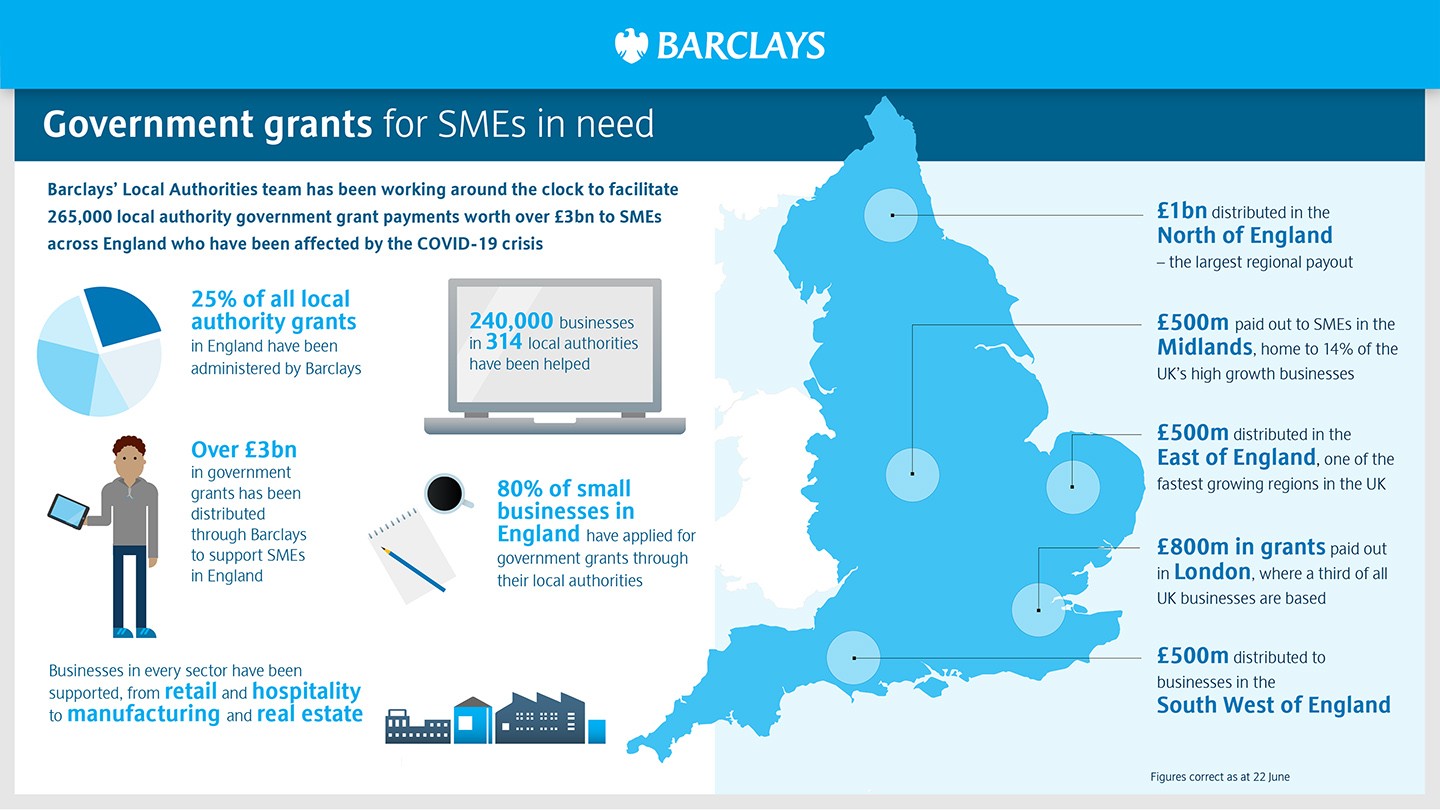
Impact
“Local authorities are the unsung heroes of the coronavirus crisis”
Barclays has administered around £3bn in government grants to small businesses hit by the coronavirus crisis. We talk to Fraser Mackay, Head of Local Authorities at Barclays Corporate Banking, about how the money is being used – and why this help is giving SMEs the “breathing space” they need.
“The support will have given small businesses some breathing space – it will have provided some much-needed cash at a time when income has all but dried up.”
For many businesses up and down the country, the grants made available by government to businesses impacted by coronavirus are crucial to their survival and recovery, says Fraser Mackay, Head of Local Authorities at Barclays Corporate Banking.
In England, small and medium sized businesses (SMEs) can apply for a one-off grant of up to £10,000, while businesses in the retail, hospitality and leisure sectors can apply for a grant of either £10,000 or £25,000, dependent on their rateable value.
So far, Barclays has facilitated such awards to up to 240,000 SMEs hit by coronavirus in England – amounting to around £3bn in total.

Barclays has distributed £3bn in local authority grants to SMEs in England
“Businesses will have the cash available to them so that as we come out of lockdown, they’ll be able to buy supplies in order to get up and running. These grants will go a long way to help small businesses who need to make adjustments – such as around social distancing requirements – to how their business operates,” he says.
Getting coronavirus grants to businesses in need
As head of the department that has administered a quarter of the one million grants currently available, Mackay says this money will be key to revitalising the economy post-coronavirus – particularly in the retail, hospitality and leisure sectors and harder-hit areas in the UK.
More than £1bn has been distributed in the North of England and £500m in the Midlands, while just under £800m has been paid out in London, where around a third of all UK businesses are based.
But, says Mackay, while about 80% of small businesses around the country have applied for a grant, there is concern that there are SMEs who still aren’t aware of the scheme.
“In our experience, about 20% of clients don’t want to apply for grants, while others might not even be aware they are eligible,” he says. “I would encourage any small business across the country to apply to their local authority.”

These grants will go a long way to help small businesses who need to make adjustments – such as around social distancing requirements – to how their business operates
Head of Local Authorities, Barclays Corporate Banking
Barclays’ Local Authorities team is made up of 34 Relationship Directors and Relationship Support Managers, and has, for over 10 years, developed close working relationships with councils nationwide.
Mackay says the team adopted an ‘all-hands-on-deck’ attitude to ensure money was made available as quickly as possible, and is proud that an ‘internal taskforce’ was quickly mobilised “to make sure that when they come to making those payments to needy businesses, they’re made on time and without any issues”.
He adds: “Whether it was the digital team, legal team or operations, everyone was willing to step up to the plate. Without that sort of collaboration there was no way we would have been able to get those payments out on time and with the level of quality that we did.”
Local authorities are the ‘unsung heroes’ of the pandemic
Mackay says dealing with the pandemic has been a particular challenge for local authorities, “not least because they have seen significant cuts in their workforce over the last 10 years”.
“The local authorities are, in my mind, the real unsung heroes of the coronavirus crisis,” he adds.
He predicts that a continued move away from cash and cheques and towards digitised payments – a development that Barclays had already been supporting – will be one of the lasting changes in the way local authorities operate after the coronavirus crisis.
“I also think the way local services have been working with others, such as the NHS, is indicative of the ways we might see national organisations working together more collaboratively,” he says.
Asked for his message to those working in local government at this challenging time, he simply says: “Carry on as you are – the work that is being delivered and the people that are being supported by the fantastic work that you are doing is making a difference.”